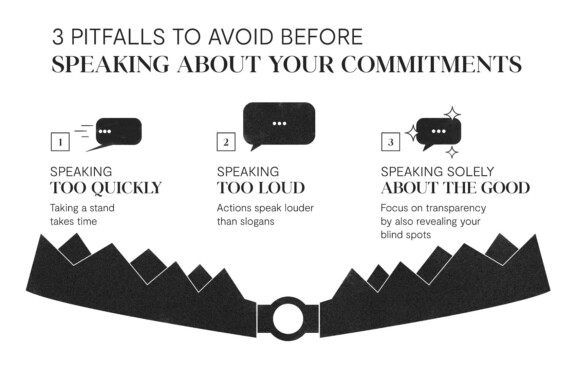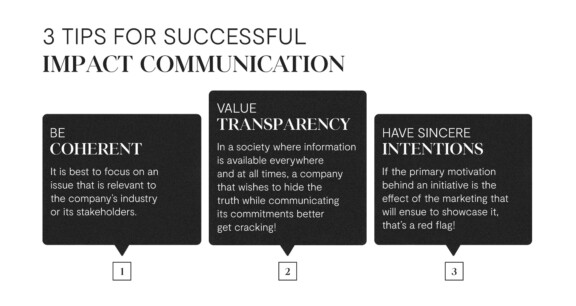Impact Communication: 3 Pitfalls to Avoid Before Speaking About your Commitments

Share:
In the past, it was customary for a company to make money on one side and do good on the other. The days of philanthropy aren’t completely over, but today, brands are no longer just looking to make a profit to then donate money.
Creating shared value allows a company to simultaneously grow while also having a positive impact on the world in which it lives.
However, this equation isn’t without risks. A brand that wants to take a stand or communicate its commitments can very easily fall into opportunism and be worse off than before. That’s why, as Partner and Chief of Strategy at Republik, I hoped to share three pitfalls to avoid followed by three tips to successfully communicate your positive impact.
Pitfall #1—Speaking Too Quickly
Brands that try to take a stand at all costs often pay a heavy reputational price. Especially in the case of companies that are not already taking concrete action to address the issue that is making headlines. They would be better off listening rather than speaking, and focusing their efforts on better understanding the issue at hand.
What You Need to Remember
Pitfall #2—Speaking Too Loud
If your impact communication is accompanied by fanfare, a tiered cake and a shower of confetti, your actions must be truly worthy of celebration. Standing up for an issue attracts attention, so a brand must be prepared to back up its claims with numbers and a plan. When speaking up, a company should plan their communications strategy commensurate with the impact of the initiative in question.
What you need to Remember
Actions speak louder than slogans.
Pitfall #3—Speaking Solely About the Good
Companies often have the reflex to share solely the good and to sweep the bad under the rug. Brands end up showing only the glimmering tip of the corporate iceberg. In today’s world, where consumers value transparency, companies would do well to talk openly about their blind spots as well.
What you need to Remember
In impact communication, your approach is just as important as its effect.

3 Tips for Successful Impact Communication
Conseil #1 – Faire preuve de cohérence
Before we even think about making a commitment, we need to consider how coherent it is with our past actions. A manufacturer cannot credibly position itself overnight on the protection of the environment if it has never thought about supplying itself locally or reducing waste.
Every company has to start somewhere, that’s true, but those that do start to approach impact commitments should shy away from making grand statements. If the brand has an established Corporate Social Responsibility roadmap, then it makes sense to share an impact story, for it is supported by facts and actions.
Finally, a brand would benefit from making thoughtful and intentional choices regarding social and environmental promises. It is best to focus on an issue that is relevant to the company’s industry or stakeholders.
Similarly, international days that punctuate our calendar should be used sparingly to avoid blatant opportunism. You can always count on people exposing you in the comments.
What You Need to Ask Yourself
What actions have I taken in the past? What is my vision for the future in terms of impact? How far is my company willing to go?
What You Should Avoid Doing
“We haven’t done anything all year for the LGBTQ+ community, but Pride Month is coming up so we thought we’d add a rainbow to the logo on our social platforms.”
Tip #2—Value transparency
Greenwashing is endemic among companies that want to perfect their moral facade without having a solid foundation in impact to back it up. Not to mention the many other—washings in this world, such as pink-washing (LGBTQ+ rights) and purple-washing (gender equality). Yet, Quebecers and Canadians are progressively more knowledgeable about environmental issues and social causes.
On that topic, purchasing power is increasingly in the hands of consumers who care about social issues such as diversity and inclusion, systemic racism and indigenous claims. In a society where information is available everywhere and at all times, a company that strives to hide the truth while communicating its commitments better be ready to face the music!
As people become more informed and equipped to understand impact commitments, companies must also understand the scope of the words they use to communicate. The terms “diversity”, “feminist” and “green” don’t mean much if they’re used interchangeably. It’s better to clearly communicate how a product or service has a positive impact on the planet or society. Being transparent can help engage and retain customers. It pays to speak the truth!
What You Need to Ask Yourself
Am I trying to hide information that could undermine the credibility of my commitment? Am I able to answer uncomfortable questions about my company’s practices? Am I able to measure my company’s impact on this issue?
What You Should Avoid Doing
“The backpacks we sell are made in part from recycled materials… Don’t tell anyone, but that part represents 5% of the finished product.”
Tip #3—Have Sincere Intentions
The notion of intentionality is key in impact. If the primary motivation behind an initiative is getting good press, that’s already a red flag.
The impact industry is not immune to trends either, so be sure to anchor yourself in something a little more solid than today’s zeitgeist. Instead of creating a new line of trendy recycled plastic products, a company could address the very presence of plastic bottles in the oceans.
In the end, every business has the potential to make a difference. Whether it’s an SME or a multinational, a brand can choose to generate a positive impact within its operations, its work environment, its relationship with its partners and its involvement in the community. The important thing is to do it with intention and to generate real results.
What You Need to Ask Yourself
What actions could my brand take to actively contribute to a cause it cares about? What is the intention behind this new commitment? Do I really want to have an impact? Have I taken the time to consult with the people involved before making a decision that affects them?
What You Should Avoid Doing
“I’d like to sell products made from recycled materials because it’s in right now!”

In the End, What You Need to Remember
The intensity of our impact communications must be justified by a long-term ESG roadmap. Once we’ve outlined commitments that are coherent with our brand, we must ask ourselves if we are able to address them transparently, to support them with credible numbers and genuine actions, not just commercial ones.



